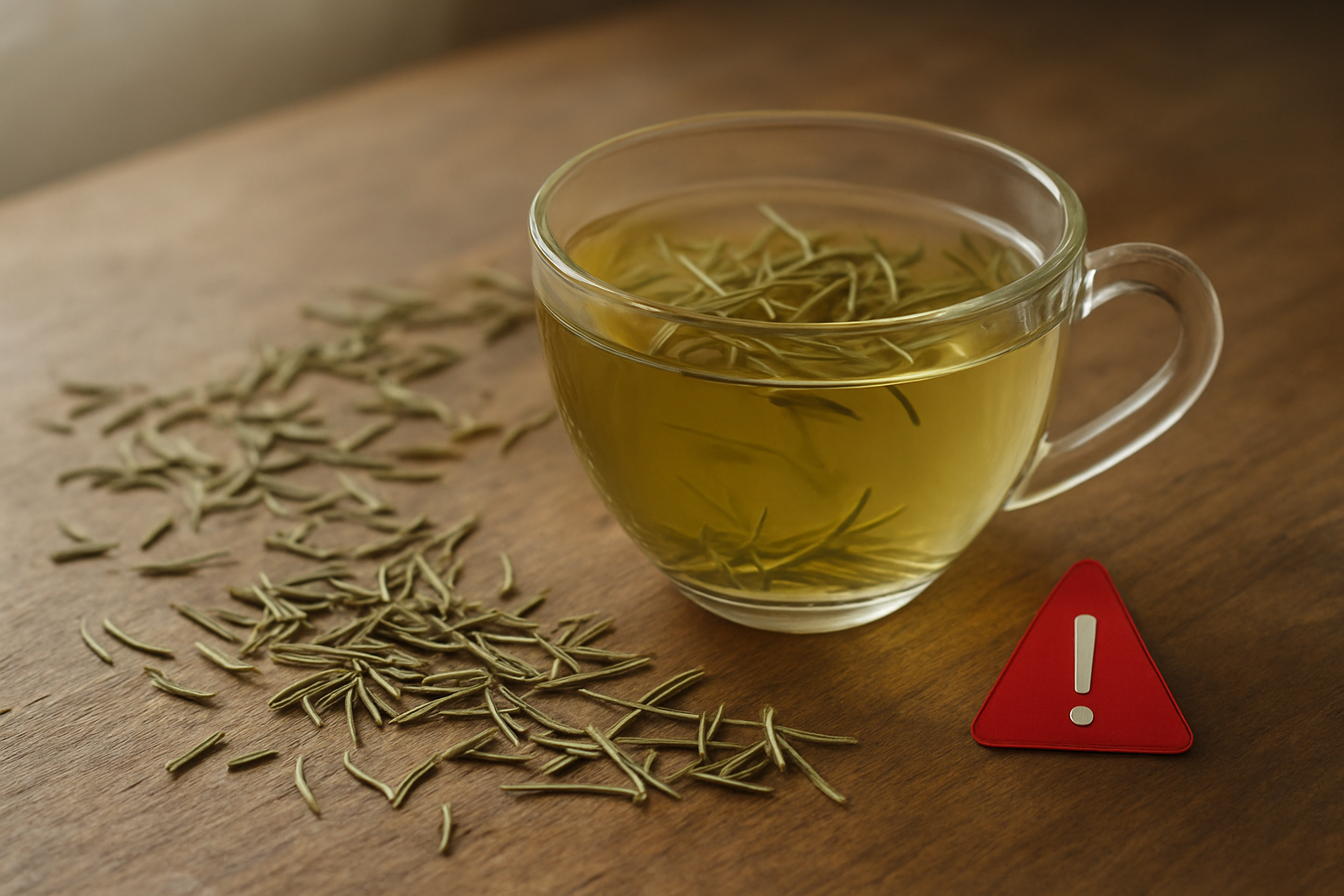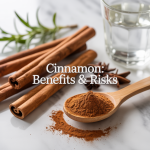Rosemary tea offers a unique blend of earthy flavor and potential health benefits that’s catching the attention of wellness enthusiasts and herbal tea lovers alike. This aromatic beverage, made from the same herb you sprinkle on roasted potatoes, packs more punch than you might expect.
This guide is perfect for anyone curious about adding rosemary tea to their daily routine, from beginners exploring herbal teas to health-conscious individuals seeking natural wellness options. You’ll discover the science-backed benefits that make rosemary tea stand out from other herbal brews, learn about important safety considerations and potential side effects, and get practical tips for brewing and enjoying this fragrant tea at home.
What Makes Rosemary Tea a Powerful Health Beverage

Active compounds that deliver therapeutic effects
Rosemary tea gets its remarkable health properties from a complex mix of bioactive compounds that work together like a natural pharmacy. The star players include rosmarinic acid, carnosic acid, and carnosol – powerful antioxidants that fight free radicals and reduce inflammation throughout your body. These phenolic compounds give rosemary its distinctive earthy flavor while delivering serious therapeutic punch.
The essential oils in rosemary, particularly 1,8-cineole (eucalyptol), camphor, and α-pinene, contribute to the tea’s ability to boost mental clarity and support respiratory health. These volatile compounds easily cross the blood-brain barrier, which explains why a simple cup of rosemary tea can sharpen your focus and improve memory function.
Flavonoids like diosmin, luteolin, and apigenin add another layer of health benefits, supporting cardiovascular health and providing anti-inflammatory effects. The diterpenes present in rosemary also show promising neuroprotective qualities, potentially helping to preserve cognitive function as we age.
Traditional uses across different cultures
Ancient civilizations recognized rosemary’s healing power long before modern science could explain why it worked so well. In ancient Greece, students wore rosemary garlands while studying, believing it enhanced memory – a practice that turns out to have scientific backing. The Greeks also burned rosemary as incense in temples, associating it with remembrance and mental clarity.
Mediterranean cultures have brewed rosemary tea for centuries to treat digestive issues, headaches, and fatigue. Spanish folk medicine traditions use rosemary tea as a morning tonic to energize the body and mind, while Italian herbalists recommend it for circulation problems and joint discomfort.
Middle Eastern cultures incorporated rosemary tea into their wellness routines for respiratory support, particularly during cold seasons. Traditional Persian medicine valued rosemary tea for its warming properties and ability to stimulate circulation.
Native American tribes in regions where rosemary grew wild used similar preparations for ceremonial purposes and to treat various ailments. European monasteries cultivated rosemary specifically for medicinal teas, documenting its effectiveness for everything from poor digestion to mental fog.
How preparation method affects potency
The way you prepare rosemary tea dramatically impacts its therapeutic potential. Water temperature plays a crucial role – using water that’s too hot (over 212°F) can destroy delicate compounds and create a bitter, less effective brew. The sweet spot sits between 190-200°F, hot enough to extract the beneficial compounds without damaging them.
Steeping time matters just as much. A quick 3-4 minute steep extracts the lighter, more volatile compounds that support mental clarity and respiratory health. Longer steeping times of 7-10 minutes pull out more of the heavier antioxidants and anti-inflammatory compounds, creating a stronger, more therapeutic tea.
The preparation vessel also influences potency. Glass or ceramic teapots preserve the tea’s integrity better than metal containers, which can react with the compounds and alter the flavor profile. Covering your tea while it steeps prevents the essential oils from escaping with the steam.
Cold brewing rosemary tea over 6-12 hours extracts different compounds than hot brewing, creating a milder flavor with different therapeutic properties. This method works particularly well for people who find hot-brewed rosemary tea too intense.
Differences between fresh and dried rosemary tea
Fresh rosemary creates a brighter, more vibrant tea with higher concentrations of volatile essential oils. The living plant contains moisture that helps release these oils more readily during brewing, resulting in a tea that’s particularly effective for mental clarity and respiratory support. You’ll need about 1 tablespoon of fresh rosemary per cup of water.
Dried rosemary offers different advantages. The dehydration process concentrates certain compounds while reducing others, creating a tea with more stable antioxidant content and longer shelf life. Dried rosemary tea tends to have a deeper, more earthy flavor and requires less herb per cup – typically 1 teaspoon per cup of water.
The timing of harvest affects both forms. Fresh rosemary picked just before flowering contains peak essential oil levels, while rosemary harvested later in the season has higher concentrations of antioxidant compounds. Properly dried rosemary retains most therapeutic compounds for 1-2 years when stored correctly.
Quality matters significantly with both forms. Fresh rosemary should look vibrant green without dark spots or wilting, while high-quality dried rosemary maintains its color and releases fragrant oils when crushed between your fingers. Organic varieties of both fresh and dried rosemary typically offer higher compound concentrations since they’re grown without chemicals that can interfere with the plant’s natural defense mechanisms.
Science-Backed Health Benefits of Rosemary Tea

Cognitive Enhancement and Memory Improvement
Research shows that rosemary tea can significantly boost brain function and memory performance. The key compound responsible for these effects is rosmarinic acid, which crosses the blood-brain barrier and protects neurons from oxidative stress. Studies have found that people who regularly consume rosemary tea perform better on memory tests and show improved concentration levels.
The herb contains carnosic acid, another powerful compound that stimulates the production of nerve growth factor. This protein helps repair damaged brain cells and promotes the formation of new neural connections. Clinical trials have demonstrated that participants drinking rosemary tea daily for six weeks showed measurable improvements in working memory and processing speed compared to control groups.
Anti-inflammatory Properties for Joint and Muscle Health
Rosemary tea acts as a natural anti-inflammatory agent, making it particularly beneficial for people dealing with joint pain or muscle soreness. The tea contains multiple anti-inflammatory compounds, including rosmarinic acid and caffeic acid, which help reduce inflammation markers throughout the body.
Regular consumption can help manage symptoms of arthritis and other inflammatory conditions. The anti-inflammatory effects work by inhibiting the production of inflammatory enzymes like cyclooxygenase and lipoxygenase. Many people report reduced morning stiffness and improved mobility after incorporating rosemary tea into their daily routine.
Athletes and fitness enthusiasts often use rosemary tea as a natural recovery aid, as it helps reduce exercise-induced inflammation and muscle damage. The compounds in rosemary tea can also improve blood flow to affected areas, speeding up the healing process.
Digestive Support and Gut Health Benefits
Rosemary tea offers remarkable support for digestive health through its carminative and antispasmodic properties. The herb helps relax smooth muscle tissue in the digestive tract, reducing bloating, gas, and stomach cramps. People with irritable bowel syndrome often find relief when drinking rosemary tea before or after meals.
The tea stimulates the production of digestive enzymes and bile, improving the breakdown and absorption of nutrients. This enhanced digestive efficiency can help prevent common issues like indigestion and heartburn. The antimicrobial properties of rosemary also help maintain a healthy balance of gut bacteria by inhibiting harmful microorganisms while supporting beneficial flora.
Regular consumption may help strengthen the intestinal barrier and reduce inflammation in the gut lining, which is particularly beneficial for people with inflammatory bowel conditions or food sensitivities.
Antioxidant Protection Against Cellular Damage
Rosemary tea ranks among the most potent antioxidant beverages available, containing over 20 different antioxidant compounds. These molecules neutralize free radicals that cause cellular damage and accelerate aging. The primary antioxidants include rosmarinic acid, carnosic acid, and various phenolic compounds that work synergistically to protect cells.
Studies show that rosemary tea has higher antioxidant activity than many commercial antioxidant supplements. This protection extends to DNA, preventing mutations that could lead to cancer and other diseases. The antioxidants in rosemary tea also protect the skin from UV damage and environmental pollutants, helping maintain a youthful appearance.
The tea’s antioxidant compounds accumulate in body tissues over time, providing long-lasting protection against oxidative stress. This cumulative effect makes regular consumption more beneficial than occasional use.
Circulation Boost and Cardiovascular Support
Rosemary tea naturally improves circulation by dilating blood vessels and reducing blood viscosity. The herb contains compounds that help relax arterial walls, allowing blood to flow more freely throughout the body. This improved circulation delivers more oxygen and nutrients to tissues while helping remove metabolic waste products.
The cardiovascular benefits extend to heart health as well. Rosemary tea helps reduce blood pressure in people with mild hypertension and may help lower cholesterol levels. The antioxidants protect blood vessels from damage and reduce the risk of atherosclerosis.
People with poor circulation, including those with diabetes or peripheral artery disease, often experience improved symptoms after regular rosemary tea consumption. The enhanced blood flow can help reduce cold hands and feet, improve wound healing, and boost overall energy levels.
Potential Risks and Side Effects to Consider

Drug Interactions and Medication Conflicts
Rosemary tea can interfere with several medications, creating potentially dangerous situations. Blood thinners like warfarin pose the biggest concern since rosemary contains natural compounds that affect blood clotting. Drinking rosemary tea while taking these medications could increase bleeding risk or make the drugs less effective.
Diabetes medications also interact poorly with rosemary tea. The herb naturally lowers blood sugar levels, and combining it with diabetes drugs might cause blood sugar to drop too low. This creates a dangerous situation that requires immediate medical attention.
Blood pressure medications present another risk area. Rosemary can influence blood pressure, potentially making these medications work too well or not well enough. ACE inhibitors and diuretics are particularly problematic when combined with regular rosemary tea consumption.
Lithium users face special risks because rosemary affects how the kidneys process this medication. The interaction can lead to toxic lithium levels in the blood, which causes serious health problems.
Always talk to your healthcare provider before adding rosemary tea to your routine if you take any prescription medications. They can advise you on safe timing, dosage adjustments, or whether you should avoid rosemary tea completely.
Pregnancy and Breastfeeding Safety Concerns
Pregnant women should avoid rosemary tea entirely. The concentrated compounds in rosemary can stimulate the uterus, potentially triggering contractions and increasing miscarriage risk, especially during early pregnancy. Even small amounts pose unnecessary risks to both mother and developing baby.
The herb contains camphor and other volatile oils that cross the placental barrier. These compounds can affect fetal development and may cause complications during pregnancy. Medical professionals consistently recommend avoiding rosemary in medicinal quantities during all trimesters.
Breastfeeding mothers face similar concerns. Rosemary compounds pass into breast milk and can affect nursing infants. Babies’ immature digestive and nervous systems can’t process these compounds properly, potentially causing irritability, digestive upset, or other complications.
Some traditional uses of rosemary actually targeted menstrual regulation and labor induction, which clearly demonstrates why pregnant and breastfeeding women should steer clear. Even though these uses were historical, they highlight the herb’s powerful effects on reproductive health.
If you’re trying to conceive, pregnant, or breastfeeding, choose safer herbal teas like chamomile or ginger instead. Your healthcare provider can suggest appropriate alternatives that won’t put you or your baby at risk.
Allergic Reactions and Sensitivity Symptoms
Rosemary allergies, while uncommon, can cause serious reactions. People allergic to other plants in the mint family (like basil, oregano, or sage) have higher chances of reacting to rosemary tea. Cross-reactivity between these plants means sensitivity to one often indicates sensitivity to others.
Skin reactions appear most frequently and include hives, rashes, or contact dermatitis. These symptoms can develop within minutes or take several hours to appear after drinking rosemary tea. The rash might spread beyond the initial contact area and can become quite uncomfortable.
Respiratory symptoms signal more serious allergic reactions. Difficulty breathing, wheezing, or chest tightness require immediate medical attention. These symptoms can escalate quickly, especially in people with existing respiratory conditions like asthma.
Digestive upset often accompanies rosemary sensitivity. Nausea, stomach cramps, diarrhea, or vomiting can occur even with small amounts of tea. These symptoms usually develop within 30 minutes to 2 hours after consumption.
Severe allergic reactions (anaphylaxis) are rare but possible. Symptoms include swelling of the face, lips, or throat, severe difficulty breathing, and rapid pulse. This medical emergency requires immediate emergency care.
People with seasonal allergies or multiple food sensitivities should start with very small amounts of rosemary tea to test their tolerance. Stop drinking immediately if any concerning symptoms develop and consult a healthcare provider about safe alternatives.
Practical Ways to Incorporate Rosemary Tea into Daily Life

Best Times of Day for Consumption
The timing of your rosemary tea consumption can significantly impact its effectiveness and your daily routine. Morning hours offer the ideal window for enjoying this aromatic beverage, as rosemary’s natural energizing properties help kickstart your mental clarity without the jitters that coffee might bring. Drinking a cup between 7-9 AM allows you to harness rosemary’s cognitive-boosting compounds when your brain is naturally primed for focus and productivity.
Mid-afternoon consumption, around 2-3 PM, provides an excellent natural pick-me-up during the typical energy slump many people experience. This timing helps combat mental fatigue while avoiding interference with nighttime sleep patterns. Avoid drinking rosemary tea within 4-5 hours of bedtime, as its stimulating properties might disrupt your sleep cycle.
For those using rosemary tea therapeutically for digestive support, consuming it 30 minutes before meals can help prepare your digestive system. Students and professionals facing demanding cognitive tasks benefit most from drinking rosemary tea 15-30 minutes before important meetings, study sessions, or creative work.
Optimal Brewing Techniques for Maximum Benefits
Proper brewing technique makes the difference between a mediocre cup and a therapeutically potent rosemary tea. Start with high-quality water heated to 200-212°F (just below boiling point) to extract maximum beneficial compounds without destroying heat-sensitive nutrients.
Fresh vs. Dried Rosemary Ratios:
- Fresh rosemary: 1-2 teaspoons of chopped leaves per 8 oz water
- Dried rosemary: 1 teaspoon per 8 oz water
Steeping time plays a crucial role in potency. Allow fresh rosemary to steep for 5-7 minutes, while dried rosemary requires 7-10 minutes for optimal extraction. Longer steeping times increase the concentration of active compounds but may result in a more bitter taste.
Cover your cup or teapot during steeping to prevent volatile oils from escaping. These oils contain many of rosemary’s therapeutic compounds, including rosmarinic acid and carnosic acid. Gently pressing the leaves with a spoon during the final minute of steeping helps release additional beneficial compounds.
For enhanced potency, try the double-brew method: use half the water amount initially, steep for the full time, then add the remaining hot water. This technique concentrates the active ingredients while maintaining palatability.
Flavor Combinations and Recipe Variations
Rosemary’s piney, slightly medicinal flavor pairs beautifully with various ingredients that can enhance both taste and therapeutic benefits. Lemon juice adds vitamin C while mellowing rosemary’s intensity, creating a refreshing morning blend that supports immune function.
Popular Flavor Combinations:
- Honey + Lemon: Classic pairing that soothes the throat while adding natural sweetness
- Ginger + Rosemary: Powerful anti-inflammatory combination perfect for cold seasons
- Mint + Rosemary: Cooling blend ideal for hot weather and digestive support
- Lavender + Rosemary: Calming yet focusing combination for stress relief
Therapeutic Blend Recipes:
| Blend Name | Ingredients | Benefits | Steeping Time |
|---|---|---|---|
| Brain Boost | Rosemary + Ginkgo + Green tea | Cognitive enhancement | 5-7 minutes |
| Digestive Aid | Rosemary + Fennel + Chamomile | Stomach support | 8-10 minutes |
| Immunity Blend | Rosemary + Echinacea + Orange peel | Immune system support | 7-9 minutes |
Cold-brew rosemary tea offers a different flavor profile and may preserve certain heat-sensitive compounds. Combine rosemary with cold water and refrigerate for 6-12 hours. This method produces a milder, less bitter tea perfect for hot summer days.
For culinary applications, rosemary tea ice cubes add subtle herbal notes to cocktails, mocktails, or fruit-infused water. You can also reduce rosemary tea into a syrup for drizzling over desserts or mixing into sparkling water.
Storage Tips to Maintain Freshness and Potency
Proper storage ensures your rosemary tea maintains its therapeutic properties and aromatic appeal over time. Fresh rosemary requires different handling than dried varieties to preserve maximum potency.
Fresh Rosemary Storage:
Store fresh rosemary sprigs in the refrigerator wrapped in slightly damp paper towels, then placed in a plastic bag. This method maintains freshness for 2-3 weeks. For longer storage, freeze fresh rosemary in ice cube trays covered with water or olive oil. Frozen rosemary maintains its potency for up to 6 months.
Dried Rosemary Storage:
Keep dried rosemary in airtight containers away from light, heat, and moisture. Glass jars with tight-fitting lids work best, stored in cool, dark pantry locations. Properly stored dried rosemary maintains potency for 2-3 years, though optimal flavor diminishes after 12-18 months.
Pre-made Tea Blend Storage:
If you prepare large batches of rosemary tea blends, store them in sealed containers with labels indicating ingredients and preparation dates. Vacuum-sealed bags offer excellent protection against air exposure and moisture absorption.
Quality Indicators:
Fresh rosemary should maintain its vibrant green color and strong aromatic scent. Brown, wilted leaves indicate degradation of active compounds. Dried rosemary should retain its gray-green color and release fragrant oils when crushed between fingers. Musty odors or loss of scent signal decreased potency.
Check stored rosemary monthly for signs of mold or pest intrusion, especially in humid climates. Replace any compromised herbs immediately to prevent contamination of your entire supply.
Guidelines for Safe and Effective Consumption

Recommended Daily Dosage Limits
When it comes to rosemary tea, moderation is your best friend. Most herbalists recommend limiting your intake to 1-2 cups per day, with each cup containing about 1 teaspoon of dried rosemary or 1-2 teaspoons of fresh leaves. This translates to roughly 4-6 grams of rosemary daily, which provides therapeutic benefits without overwhelming your system.
The timing of your consumption matters too. Spreading your intake throughout the day works better than drinking multiple cups at once. Try having one cup in the morning to kickstart your focus and another in the afternoon when you need a natural energy boost. Avoid drinking rosemary tea late in the evening, as its stimulating properties might interfere with your sleep.
If you’re new to rosemary tea, start with just half a cup daily for the first week. This gradual approach helps you gauge how your body responds to the herb’s potent compounds. Some people experience stronger effects than others, so personalizing your dosage based on your individual tolerance makes sense.
Who Should Avoid Rosemary Tea Completely
Several groups of people should steer clear of rosemary tea entirely. Pregnant and breastfeeding women top this list because rosemary can stimulate uterine contractions and potentially affect milk production. The herb’s emmenagogue properties make it particularly risky during pregnancy.
People with epilepsy or seizure disorders need to avoid rosemary tea completely. The herb contains compounds that can trigger seizures in susceptible individuals, even in small amounts. This isn’t a risk worth taking, regardless of the potential benefits.
If you have high blood pressure, rosemary tea isn’t for you. The herb can raise blood pressure levels, which could be dangerous if you already struggle with hypertension. Similarly, people taking blood thinning medications should avoid rosemary tea since it can enhance the effects of these drugs and increase bleeding risk.
Those with kidney or liver disease should also skip rosemary tea. These organs process the herb’s compounds, and compromised organ function could lead to harmful accumulation in your system.
Signs That Indicate You Should Reduce Intake
Your body gives clear signals when you’re overdoing it with rosemary tea. Headaches are often the first warning sign, especially if they’re persistent or unusual for you. These headaches typically feel different from your regular ones and may be accompanied by a feeling of mental fog rather than clarity.
Digestive upset is another red flag. If you start experiencing stomach pain, nausea, or unusual bowel movements after drinking rosemary tea, your system is telling you to cut back. Some people also report increased urination or changes in urine color, which can indicate that your kidneys are working overtime to process the herb.
Sleep disturbances deserve attention too. If you find yourself lying awake at night despite feeling tired, or if your sleep quality has decreased since starting rosemary tea, reduce your intake or avoid drinking it after 2 PM.
Skin reactions like rashes, itching, or unusual sensitivity might develop in people who are overdoing it. These symptoms often appear on the hands and face first. Mood changes, particularly increased irritability or anxiety, can also signal that you need to dial back your consumption. Your usual calm demeanor shouldn’t disappear because of an herbal tea.

Rosemary tea brings together centuries of traditional wisdom with modern scientific research, offering impressive benefits like better memory, reduced inflammation, and antioxidant protection. The herb’s natural compounds can support brain function, help manage blood sugar levels, and even promote healthy digestion. While most people can enjoy rosemary tea safely, it’s smart to start with small amounts and pay attention to how your body responds, especially if you’re pregnant, nursing, or taking medications.
Making rosemary tea part of your daily routine doesn’t have to be complicated. Whether you brew it fresh from your garden or use dried herbs from the store, a cup or two throughout the day can be a simple way to boost your wellness routine. Just remember that balance is key – like any herbal remedy, rosemary tea works best when you use it thoughtfully and consistently rather than expecting overnight miracles.









